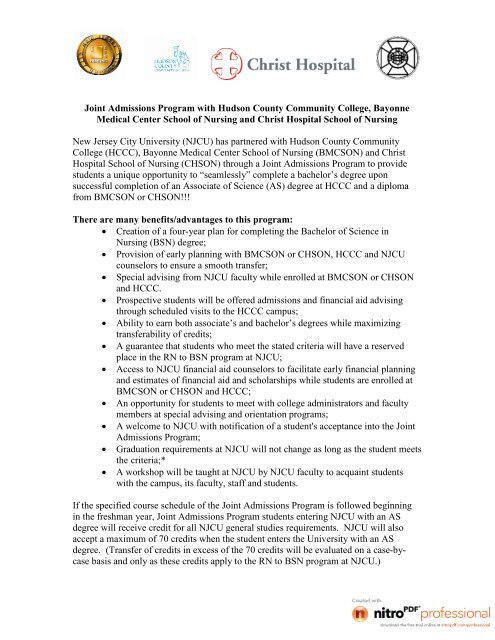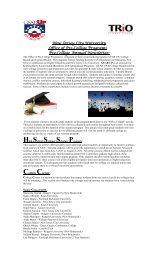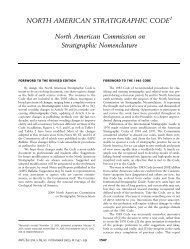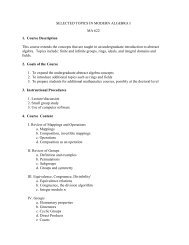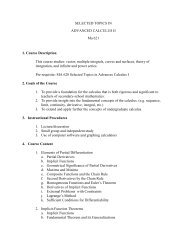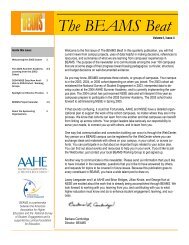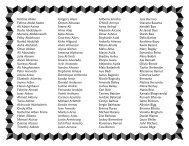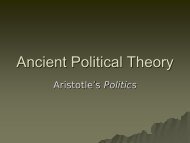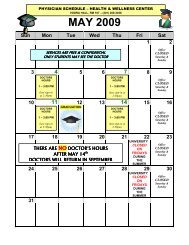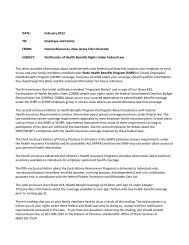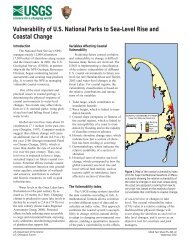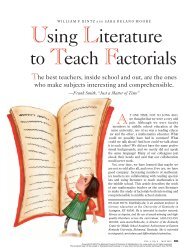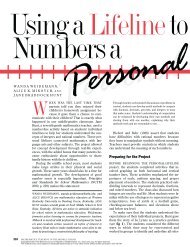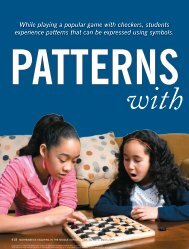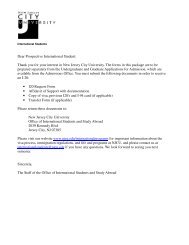To Earn Both Associate's And Bachelor's Degrees While
To Earn Both Associate's And Bachelor's Degrees While
To Earn Both Associate's And Bachelor's Degrees While
- No tags were found...
You also want an ePaper? Increase the reach of your titles
YUMPU automatically turns print PDFs into web optimized ePapers that Google loves.
Joint Admissions Program with Hudson County Community College, BayonneMedical Center School of Nursing and Christ Hospital School of NursingNew Jersey City University (NJCU) has partnered with Hudson County CommunityCollege (HCCC), Bayonne Medical Center School of Nursing (BMCSON) and ChristHospital School of Nursing (CHSON) through a Joint Admissions Program to providestudents a unique opportunity to “seamlessly” complete a bachelor’s degree uponsuccessful completion of an Associate of Science (AS) degree at HCCC and a diplomafrom BMCSON or CHSON!!!There are many benefits/advantages to this program: Creation of a four-year plan for completing the Bachelor of Science inNursing (BSN) degree; Provision of early planning with BMCSON or CHSON, HCCC and NJCUcounselors to ensure a smooth transfer; Special advising from NJCU faculty while enrolled at BMCSON or CHSONand HCCC. Prospective students will be offered admissions and financial aid advisingthrough scheduled visits to the HCCC campus; Ability to earn both associate’s and bachelor’s degrees while maximizingtransferability of credits; A guarantee that students who meet the stated criteria will have a reservedplace in the RN to BSN program at NJCU; Access to NJCU financial aid counselors to facilitate early financial planningand estimates of financial aid and scholarships while students are enrolled atBMCSON or CHSON and HCCC; An opportunity for students to meet with college administrators and facultymembers at special advising and orientation programs; A welcome to NJCU with notification of a student's acceptance into the JointAdmissions Program; Graduation requirements at NJCU will not change as long as the student meetsthe criteria;* A workshop will be taught at NJCU by NJCU faculty to acquaint studentswith the campus, its faculty, staff and students.If the specified course schedule of the Joint Admissions Program is followed beginningin the freshman year, Joint Admissions Program students entering NJCU with an ASdegree will receive credit for all NJCU general studies requirements. NJCU will alsoaccept a maximum of 70 credits when the student enters the University with an ASdegree. (Transfer of credits in excess of the 70 credits will be evaluated on a case-bycasebasis and only as these credits apply to the RN to BSN program at NJCU.)
* Students completing the AS degree course work at HCCC and matriculating at NJCUwithin four years of the student’s first enrollment in a nursing course at BMCSON orCHSON will follow the undergraduate college degree requirements in place at NJCU atthe time of initial enrollment in a nursing course at BMCSON or CHSON. If more thanfour years elapses between the date of initial enrollment in a nursing course at BMCSONor CHSON and the date of matriculation at NJCU, the student must fulfill the degreerequirements in place at the time of entrance to NJCU.More information may be found at the following links:View the summary of RN to BSN program courses for HCCC and BMCSON.View the summary of RN to BSN program courses for HCCC and CHSON.View a sample design of the RN to BSN program course requirements for JointAdmissions Program students entering NJCU in the fall semester.View the course descriptions for the RN to BSN program at NJCU.View the requirements for admission to NJCU under the Joint Admissions Program.
Below is a summary of the RN to BSN program courses for BMCSON under theJoint Admissions Program:H uds o n C o unty C o m m unity C o lle g eB a yo nne M e dic a l C e nte r S c ho o l o f N urs ingN J C U A C C EP TS 7 0 C R ED ITSC our s eC r e ditsCSS 100 – Co lle g e Su rv iv a l Skills 1EN G 101 – Co lle g e Co mp o s itio n I 3EN G 102 – Co lle g e Co mp o s itio n II 3CSC 100 – In tro . to Co mp u te rs & Co mp u tin g 3M A T 100 – Co lle g e A lg e b ra 3BIO 111 – A n a to my a n d Ph y s io lo g y I 4PSY 101 – In tro d u c tio n to Ps y c h o lo g y 3H U M 101 – Cu ltu re s & Va lu e s 3PSY 260 – Life s p a n D e v e lo p me n t 3EN G 112 - Sp e e c h 3BIO 250 – M ic ro b io lo g y 4BIO 211 – A n a to my & Ph y s io lo g y II 4N SG 110 – N u rs in g I 6N SG 120 – N u rs in g II 8N SG 210 – N u rs in g III 9N SG 220 – N u rs in g IV 9N SG 230 – N u rs in g Se min a r 1<strong>To</strong>tal B MC S O N & HC C C c r e dits 7 0N e w J e rs e y C ity U nive rs ityC our s eC r e ditsSO CI 114 - So c io lo g y o f th e Fa mily 3PSYC 230 - Sta tis tic s fo r th e So c ia l Sc ie n c e s 3CH EM 117 - Prin c ip le s o f Ch e mis try 4N U RS 351 - H e a lth A s s e s s me n t A c ro s s th e Life Sp a n 3* N U RS 357 - BSN T ra n s itio n s 3*(U p o n s u c c e s s fu l c o mp le tio n o f N U RS 357 - BSN T ra n s itio n s , s tu d e n ts w ill re c e iv e 17c re d its w h ic h a re h e ld in e s c ro w) 17N U RS 450 - T h e o re tic a l Ba s is o f N u rs in g 3N U RS 451 - N u rs in g Pro c e s s & H e a lth Pro mo tio n Gro u p s /Co mmu n ity T h e o ry 5N U RS 452 - N u rs in g Pro c e s s & H e a lth Pro mo tio n Gro u p s /Co mmu n ity La b o ra to ry 5N U RS 460 - N u rs in g Re s e a rc h 3N U RS 465 - Le a d e rs h ip : fo r th e N u rs e Le a d e r/M a n a g e r 3N U RS 466 - Cu ltu ra l Pa ra d ig ms fo r H e a lth Ca re 3N U RS 467 - Se n io r Se min a r Imp le me n ta tio n Pro je c t Se n io r T h e s is - Pa rt I 2N U RS 468 - Se n io r Se min a r Imp le me n ta tio n Pro je c t Se n io r T h e s is - Pa rt II 2<strong>To</strong>tal N J C U c r e dits 5 9T O T A L C R E D IT S E A R N E D F O R B S N 1 2 9Back to top
Below is a summary of the RN to BSN program courses for CHSON under the JointAdmissions Program:H uds o n C o unty C o m m unity C o lle g eC hris t H o s pita l S c ho o l o f N urs ingN J C U A C C EP TS 7 0 C R ED ITSC ours eC r e ditsCSS 100 – Co lleg e Su rv iv al Skills 1EN G 101 – Co lleg e Co mp o s itio n I 3EN G 102 – Co lleg e Co mp o s itio n II 3CSC 100 – In tro . T o Co mp u ters & Co mp u tin g 3M A T 100 – Co lleg e A lg eb ra 3BIO 111 – A n ato my an d Ph y s io lo g y I 4PSY 101 – In tro d u ctio n to Ps y ch o lo g y 3H U M 101 – Cu ltu res & Valu es 3PSY 260 – Lifes p an D ev elo p men t 3EN G 112 - Sp eech 3BIO 250 – M icro b io lo g y 4BIO 211 – A n ato my & Ph y s io lo g y II 4N SG 110 – N u rs in g I 6N SG 120 – N u rs in g II 8N SG 210 – N u rs in g III 9N SG 220 – N u rs in g IV 9N SG 230 – N u rs in g Lead ers h ip 2<strong>To</strong>tal C HS O N & HC C C c r e dits 7 1 7 0N e w J e rs e y C ity Unive rs ityC ours eC r e ditsSO CI 114 - So cio lo g y o f th e Family 3PSYC 230 - Statis tics fo r th e So cial Scien c e s 3CH EM 117 - Prin cip les o f Ch emis try 4N U RS 351 - H ealth A s s es s men t A cro s s th e Life Sp a n 3* N U RS 357 - BSN T ran s itio n s 3*(U p o n s u cces s fu l co mp letio n o f N U RS 357 - BSN T ra n s itio n s , s tu d e n ts w ill re ceiv e 17cred its w h ich are h eld in es cro w) 17N U RS 450 - T h eo retical Bas is o f N u rs in g 3N U RS 451 - N u rs in g Pro ces s & H ealth Pro mo tio n Gro u p s /Co mmu n ity T h e o ry 5N U RS 452 - N u rs in g Pro ces s & H ealth Pro mo tio n Gro u p s /Co mmu n ity La b o ra to ry 5N U RS 460 - N u rs in g Res earch 3N U RS 465 - Lead ers h ip : fo r th e N u rs e Lea d e r/M a n a g e r 3N U RS 466 - Cu ltu ral Parad ig ms fo r H ealth Ca re 3N U RS 467 - Sen io r Semin ar Imp le men tatio n Pro je c t Se n io r T h e s is - Pa rt I 2N U RS 468 - Sen io r Semin ar Imp lemen tatio n Pro je c t Se n io r T h e s is - Pa rt II 2<strong>To</strong>tal N J C U c r e dits 5 9T O T A L C R E D IT S E A R N E D F O R B S N 1 2 9Back to top
Below is a sample design of the RN to BSN program course requirements for JointAdmissions Program students entering NJCU in the fall semester:Summer ICreditsCHEM 117 – Principles of Chemistry 4Fall SemesterNURS 357 - BSN Transitions 3NURS 450 - Theoretical Basis of Nursing 3NURS 466 - Cultural Paradigms for Health Care 3PSYC 230 - Statistics in the Social Sciences 3All 4 courses are offered on the same day during each springWinter SemesterNURS 351 - Health Assessment across the Life Span 3Spring SemesterNURS 460 - Nursing Research 3NURS 451 - Nursing Process and Health PromotionGroups/Community Theory 5NURS 452 - Nursing Process and Health PromotionGroups/Community Laboratory 5All 3 classes are offered on two days during each springSummer INURS 465 - Leadership: For the Nurse Leader/Manager 3NURS 467 - Senior Seminar Implementation Project - SeniorThesis - Part I 2Summer IISOCI 114 - Sociology of the Family 3NURS 468 - Senior Seminar Implementation Project - SeniorThesis - Part II 2Back to top
Course descriptions for the RN to BSN program at NJCU are as follows:NURS 351 - Health Assessment across the Life Span (3)Basic skills in history taking, interviewing, physical assessment and teaching adults,pediatric clients and newborn clients are the focus of this course. College and clinicallaboratory work are also included.NURS 357 - BSN Transitions (3)The course is designed as a bridge course for the Registered Nurse student. The focus ison the application and methodology of the nursing process in working with individuals inthe family unit. Synthesis of the systems developmental stress model is used to assessclients as they move along the health illness continuum. Integrated concepts (e.g.,culture, public health, therapeutic communication, leadership and accountability andhealth assessment) are also addressed. This course is offered as a web enhanced course.Upon completion, students will receive the 17 credits that were held in escrow.NURS 450 - Theoretical Basis of Nursing (3)This course is an introduction to various nursing theorists and evolving theories ofnursing science which support the development of professional nursing practice.NURS 451 - Nursing Process & Health Promotion Groups/Community Theory (5)This course is designed to help the student view individuals, families, groups andcommunities as open systems in continual, mutual interaction with other systems. TheSystems Developmental-Stress Model provides the framework for assessing individuals,families, groups and communities. The biological, interpersonal, intrapersonal, nonhumanenvironmental and socio-cultural subsystems are ways in which assessment ofclients at different developmental stages from conception through elderly along thehealth-illness continuum with increased emphasis on deviations from health will beconsidered. The Nursing Process is the method by which primary, secondary, and tertiaryprevention will be promoted in individuals, families, groups and communities. PublicHealth nursing principles will be emphasized along with an introduction to thecommunity as a system. The leadership role of the nurse, the role of the nurse as changeagent based upon organization, change and group theories will be explored.NURS 452 - Nursing Process & Health Promotion Groups/Community Laboratory(5)Laboratory experiences will be coordinated with theoretical content in Nursing Process &Health Promotion Groups/Community Theory. The student will use the Nursing Processand the Systems-Developmental-Stress Model in a variety of settings with clients atdifferent developmental stages from conception through elderly. The students areencouraged to use critical thinking as they view individuals, families, groups andcommunities as open systems in continual, mutual interaction with other systems. Clientswill be assessed at various places along the health illness continuum with increased
emphasis on deviations from health. Families, groups and communities will be theprimary focus for the student as he/she continues to use Public Health principles and thecommunity as a system. Some of the laboratory settings may include: day care centers,well baby clinics, visiting nurse services, schools, hospital out-patient services, familyplanning programs, homeless shelters, community agencies and psychiatric-crisis walk-inclinics. Emphasis will be placed on individuals, families and groups as members of thecommunity.NURS 460 - Nursing Research (3)The course provides an overview of the scientific approach to problem solving andresearch methodology as applied to nursing. Throughout the semester, selected researchstudies are reviewed and analyzed. Pre-requisite: PSYC 230 - Statistics in the SocialSciences.NURS 465 - Leadership: For the Nurse Leader/Manager (3)This is a course designed to increase the ability of registered nurse leaders to useleadership skills and knowledge of organizational theory within their health careorganizations. The goal of these applications is to achieve excellence in theadministration of health care organizations and, thus in the provision of health care.NURS 466 - Cultural Paradigms for Health Care (3)This course uses the self-assessment and experiential learning approach to examineculture, the learned and shared values, beliefs, norms, and practices of a particular groupthat, implicitly or explicitly, guide thinking, decisions, and actions in a patterned way. Anorganizing framework drawn from cultural anthropology is used to examine howdifferent groups respond to universal questions regarding human nature, nature, time,valued personality types and preferred ways of interacting. These data are used toexamine how values, beliefs, customs, and behaviors, based on ethnic/culturalbackground, influence attitude towards health and illness, the health care provider, andthe health care system. Traditional and nontraditional approaches to health care arediscussed within the context of cultural values.NURS 467 - Senior Seminar Implementation Project - Senior Thesis - Part I (2)This is the capstone course in the RN to BSN program. All students are expected todemonstrate measurable proficiencies related to the program outcomes. The purpose ofthe Senior Seminar and Implementation Project/Undergraduate Thesis is to provide thestudent the opportunity to assume primary responsibility for their learning while pursuingan in-depth study in an area of nursing of their choice. The course requires application of,and builds on previous learning in nursing theory, psycho-social sciences, basic statistics,nursing research and experiential learning from their own employment. The student isencouraged to integrate the appropriate concepts of leadership, communication, research,the Nursing Process, and critical thinking across the health-illness continuum. Thecapstone course is divided into two parts taken over two semesters
Part I – In the first part of the capstone course, the student identifies an area of interest toresearch and develops a project. Following an extensive review of the literature toidentify a specific focus of study, the student develops a proposal that will guide thedevelopment of the paper and project.NURS 468 - Senior Seminar Implementation Project - Senior Thesis - Part II (2)This is the capstone course in the RN to BSN program. All students are expected todemonstrate measurable proficiencies related to the program outcomes. The purpose ofthe Senior Seminar and Implementation Project/Undergraduate Thesis is to provide thestudent the opportunity to assume primary responsibility for their learning while pursuingan in-depth study in an area of nursing of their choice. The course requires application of,and builds on previous learning in nursing theory, psycho-social sciences, basic statistics,nursing research and experiential learning from their own employment. The student isencouraged to integrate the appropriate concepts of leadership, communication, research,the Nursing Process, and critical thinking across the health-illness continuum.Part II – The second part of the capstone course involves implementing and evaluatingthe outcomes of the project. In this part, the research is completed and the scholarly paperis written. The reflective log is continued throughout this part of the course as the studentreflects upon the progress of the project in relation to the terminal objectives. The studentformally presents the project in a group.CHEM 117 – Principles of Chemistry (4)This course includes basic principles of inorganic, organic and biochemistry. It isdesigned to meet the needs of students in nursing or allied health and science educators.PSYC 230 - Statistics in the Social Sciences (3)This course offers students an introduction to the quantitative methods necessary toconduct elementary scientific research. <strong>Both</strong> descriptive and inferential statistics arecovered including measures of central tendency, t-test, correlation, and non-parametricmethods.SOCI 114 - Sociology of the Family (3)Dating, living-together arrangements, mate selection, husband-wife relations, and divorceare topics that receive major attention in this course. Discussion topics includealternatives to marriage and the family of the future.Back to top
According to the Joint Admissions Program Agreement, admission to NJCU iscontingent upon a student's: Admission to both BMCSON or CHSON and HCCC; Completion and submission of the Joint Admissions Program Application andthe Academic Record Release Form at time of acceptance to BMCSON orCHSON (and HCCC); Attainment of a grade point average of 2.0 or higher at HCCC and BMCSONor CHSON; Meeting the general admission criteria of NJCU; Submission of official transcripts of BMCSON or CHSON and HCCC and allpreviously attended nursing programs; Submission of official transcripts of all previous college work at eachinstitution attended; Presentation of the following documentation to an NJCU faculty advisor priorto taking the first clinical course within the RN to BSN program at NJCU:1. A current license as a registered nurse in New Jersey,2. Up-to-date medical and immunization records, and3. Proof of personal malpractice insurance.Back to top


